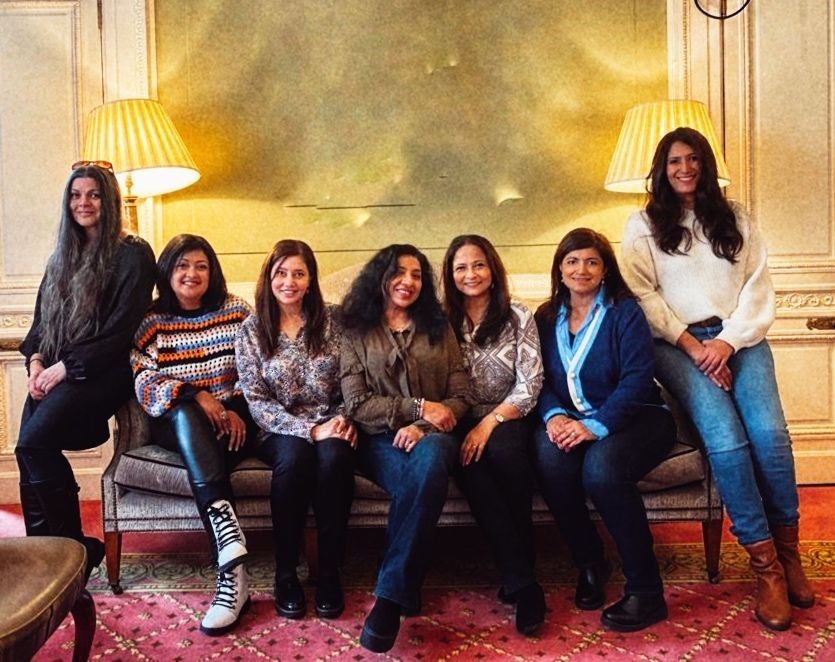search
date/time
 | Yorkshire Times A Voice of the Free Press |

Paul Spalding-Mulcock
Features Writer
@MulcockPaul
P.ublished 3rd June 2023
arts
'But Where Are You Really From?' - Tongues and Bellies by The Whole Kahani

The Whole Kahani
Without defined objectives, these groups may well offer invaluable solace and even inspiration to their members, however their creative energy can dissipate like unharnessed steam, driving no discernible piston, or tangibly meaningful output.
There isn’t a single particular way of South Asian writing, just as there isn’t one single European way of thought
A notable example of a writers' collective fully utilising the vibrant creative energy of its participants is The Whole Kahani. The group’s co-founder is Reshma Ruia, author of Mrs Pinto Drives to Happiness and Still Lives, two books suffused with moderated nuance, and the seminal theme of authentic identity. Having reviewed both of these scintillating works for our readers, I asked Reshma to tell me about the group and its objectives:“The Whole Kahani, or the complete story is a collective of British fiction writers of South Asian origin. The group was formed in 2011 and its aim is to give a new voice to British Asian fiction and increase the visibility of South Asian writers in Britain. South Asian is a convenient umbrella term for a variety of regional voices; we wanted to highlight this variety.
There isn’t a single particular way of South Asian writing, just as there isn’t one single European way of thought. There are different sensibilities, trajectories and ways of using language that do not fall into one single, one size fits all category. Our members are doctors, journalists, poets, I T media executives and novelists. We come from different parts of South Asia and are at different stages of our writing journey.
...and found it to be a kaleidoscopic, humanistic delight!
Some of us were born here whilst others are first- or second-generation immigrants who now call Britain home. Writing is a solitary business, and our collective provides a platform for us to support each other, comment on each other’s works and use our collective power to be a part of the mainstream literary conversation and not just be considered as an ‘exotic’ marginal footnote.”Returning to my point ut supra, writers’ groups can become a blazing crucible transmuting molten creative aspirations into newly forged, glistening literature. The Whole Kahani is a metaphorical smith’s workshop producing tangible objects…books.
“We have published three anthologies of short stories. Our first anthology, Love across a Broken Map looks at the permutations of love, its inconsistencies and delusions. Our second anthology, May We Borrow Your Country is an exploration of belonging and the idea of home. Our latest anthology, Tongues and Bellies is about food as a metaphor for memory, loss and desire.
All three anthologies are published by indie presses who in my opinion are supportive of new authors compared to established London-centric publishers who are more commercial and risk averse in their approach.”
I recently read Tongues and Bellies and found it to be a kaleidoscopic, humanistic delight! It consists of fourteen short stories, written by eight members of The Whole Kahani. Together these individual authors have given the reader a dazzling, multihued work as stylistically diverse as it is thematically united.
Each story operates as though a vignette within a larger work, whilst remaining entirely distinct, independently complete and demarcated from its siblings by the unique voice of its author. Cultural nuances predicated upon a unifying set of thematic motifs reverberate like a bass line rhythm, or shared heartbeat.
As with all foods, some of the stories ... are sweet and others are bitter, or at least a tad tart!
However, this anthology’s pages do not offer the reader repetitive, reductive pabulum. Instead, a colourful spectrum of diverse protagonists let the reader, “see the same light through a thousand lamps”, to quote Miyamoto Musashi. The thematic source of that figurative ‘light’ is identity, or more precisely what it means to be both British and Asian. More specifically, an exploration of the means by which cultural heritage, enshrined normative behaviours and expectations shape an individual psyche. Memories, yearnings and regret stir the pot, all blending to form a complicated sense of self.As with Ruia’s own work, this culturally idiosyncratic granularity is the exotic nexus to universal, ubiquitous truths - Tongues and Bellies characters may be wrestling with issues specific to the communities in which they live, however they all are dealing with a larger problem: how to become fully authentic human beings connected to their roots, but free to flower according to their own natures.

As with Proust and his Madeleine cake, these foods act as both the invisible bars of a birdcage, or as the transportive agency rendering the past present. Culinary traditions are embraced, rejected or synthesised into liberating fusions of both shared taste, and personal inclination. Food itself is used as the active agent helping to tell each character’s tale, if not directly then as a refracted seeing of one’s self.
As with all foods, some of the stories within Tongues and Bellies are sweet and others are bitter, or at least a tad tart! Our scribes allow us to ingest pronounced flavours, whilst fragrancing their literary dishes with subtler, more nuanced notes. To live, one has to eat and as the old adage puts it, you are what you eat!
Rather than offering the reader clumsily orchestrated didactic answers, each of the eight scribes has been far braver
That said, nothing remains distinct once consumed and this digestive blending of flavours within our own bellies serves as a powerful metaphor for the collection’s core message - identity cannot be reduced down to simple ingredients for it is a complex amalgamation of elements, however distinct those elements may seem. Tongues and Bellies took shape during the Covid 19 pandemic. At the risk of extrapolating, I suspect that fact is responsible for the anthology’s introspective character, the tightly compressed narrative arcs forming its stories and the longing to connect with both others, and self. I suspect its authors asked themselves many questions when presented with the opportunity to wrestle with the book’s seminal themes.
Rather than offering the reader clumsily orchestrated didactic answers, each of the eight scribes has been far braver: they’ve used their dextrously hewn prose to pose thorny questions for the reader to contemplate and in so doing, to share their author’s befuddled, but warm-hearted confusion. I for one thoroughly enjoyed walking a mile in their shoes and recognising that the path was both exotic, and reassuringly familiar!
NB : The contributing authors are, Catherine Menon, Deblina Chakrabarty, Kavita A.Jindal, Mona Dash, Nadia Kabir Barb, Radhika Kapur, Reshma Ruia and Khadija Rouf.
More information here
Tongues and Bellies is published by Linen Press (2021)
More information here
Tongues and Bellies is published by Linen Press (2021)